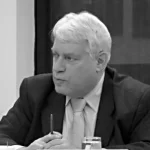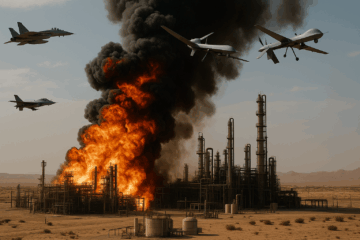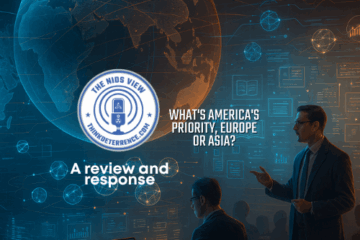The Russia-North Korea mutual security pact, Moscow’s unceasing nuclear threats, Russia’s global nuclear power sales drive, Iran’s race for nuclear weapons, and China’s “breathtaking” nuclear expansion, are the stuff of daily headlines. They all point to increasing nuclear proliferation, multiplying nuclear threats, and the emergence of an increasingly cohesive bloc of powers fully willing to threaten and possibly employ nuclear weapons.
Consequently, both nonproliferation and deterrence are under sustained attacks on multiple, interactive fronts as is any concept of international order or security. These threats challenge not only Washington but also allies in Asia, Europe, and the Middle East. This is leading to significant increases in conventional and nuclear weapons spending in Europe, the Middle East, and South Asia (India) and East Asia in reaction to Russo-Chinese, Russo-North Korean, and other threats.
It is important to understand that these nuclear and conventional threats are linked. In Ukraine, Putin began brandishing nuclear threats early in the war to allow the Russian army to proceed without the threat of Western intervention or sustained weapons supply. Iran too uses its accelerating nuclear, missile, and drone programs to extend its deterrence to its terrorist clients so that they can put Israel and Red Sea shipping at risk. The Russo-North Korean alliance similarly raises the likelihood of Pyongyang acquiring new satellite, missile, and, possibly, nuclear technologies with which it can emulate Moscow and Tehran. Meanwhile, China continues to threaten Taiwan, the Philippines, and even India, always with the threat of more attacks in the background. At the same time, Chinese aid to Russia, in the form of technology exports, is probably vital to Russian aggression.
Thus, deterrence, nonproliferation, the international order, and, more specifically, the US and its allies are all under growing threat. Rhetoric aside, the next president after the November 2024 elections must confront these unpalatable facts and speak frankly about how the nation must meet them. To sustain and reform, and it is clear the Pentagon is failing to meet the challenge, it is necessary to rebuild both conventional and nuclear deterrence as allies in Europe and Asia are doing.
To do that, the American economy requires reinvigoration. The necessity for higher defense spending is competing with unprecedented levels of social spending at a time when the nation now spends as much each year to service the national debt as it spends on defense. This economic approach is unsustainable. Unfortunately, there is no royal road to fiscal stability other than raising taxes. The best hope for the country is to grow the economy and exercise fiscal discipline while rebuilding the nation’s military.
The revitalization of American defenses requires extensive and continuous modernization of both the conventional and nuclear forces. That probably includes both a qualitative and quantitative increase in the nuclear arsenal. Undoubtedly the partisans of anti-nuclear policies will be outraged by this. But the conclusions of governmental reports and America’s adversaries’ unrelenting nuclear programs are stubborn facts that these partisans refuse to acknowledge at ever-rising risk to international security. The only way to prevent or at least arrest proliferation and threats to deterrence is this dual-track policy of conventional and nuclear modernization and reform. And this truth applies as well to allies who have already begun to implement this policy.
An improved allied conventional capability in Asia, Europe, and the Middle East allows the United States and its allies to deter future threats at the lowest level of deterrence or thwart aggression because of improved strategic unity and military superiority, backed by economic primacy. This will also deter attempts to use, for example, Russian nuclear weapons as a shield for a failed conventional war in Ukraine. It is also important to deter terror groups like Hamas and Hezbollah from attacking Israel, the United States, or other Western targets. This includes Houthi attacks on international shipping.
Moreover, the launching of such projects will also make clear to Putin, for example, that his attempts to globalize the failed war in Ukraine to rescue his regime by threatening nuclear or peripheral wars are doomed to failure. If the United States and its allies engage in the efforts suggested, it is also likely that Beijing will conclude that it cannot overcome allied deterrence in India, the Philippines, the South China Sea, Taiwan, or elsewhere. The objective is always the maintenance of peace.
Critics will complain that this program of defense growth and strengthening is a wartime program. Unfortunately, they have yet to realize that the American-led international order is under sustained and continuous attack and has been for several years. China, Iran, North Korea, and Russia are all states that validate the American radical Randolph Bourne’s insight that “[w]ar is the health of the state.” Indeed, it is the only way they can sustain their states. Therefore, in a nuclear world they must be deterred now before they can infect others with their poison.
Stephen Blank, PhD, is a Senior Fellow at the National Institute for Deterrence Studies. Views expressed are the author’s own.
About the Author

Stephen Blank
Stephen Blank, PhD, is an internationally recognized authority on Russian foreign policy matters with over 1200 published articles, fifteen books, and twenty-plus years as a call-first consultant to media worldwide, private firms, think tanks and the Congressional and Executive branches of the United States government. His expertise spans and incorporates the Russian, Soviet and post-Communist periods and speaks and writse extensively on information warfare, energy politics, foreign policy, defense policy and strategy, and American, European and Asian security concerns.
Stephen is currently an independent speaker, consultant, and writer as well as a Senior Fellow at the National Institute for Deterrence Studies. Previously, Stephen was a member of the U.S. Army War College faculty for over two decades, serving as the Douglas MacArthur Professor of Research from 1998-2001. He has had the privilege of consulting for the CIA, and the US Army, and chaired international conferences in the United States, UK, Italy, and the Czech Republic.
SPECIALTIES:
► Russian Foreign Policy
► Russian Defense Policy
► US Foreign Policy
► European and Asian Security
► International Relations
► Defense Strategy
CONTACT INFO:
Email: traininblank@aol.com or blank@afpc.org or drstephenjblank@gmail.com
Office: 202-543-1006
Home: 301-681-2964





The bipartisan nuclear commission has issued urgent recommendations re expansion of our nuclear forces. Those recommendations are being ignored it seems.
We have 2000 reserve warheads. We need to go beyond the Triad and go for distributed nuclear deterrence. By giving nuclear capability to JASSM-D, PrSM and Dark Eagle we would greatly improve our nuclear deterrence. JASSM at least should be able to accomodate a number of warheads. Think tanks need to put urgent proposals on the table what to do.
Re our large deficit, Medicare right now is a trillion a year, but only generates 400 billion in Medicare taxes. By allowing passive income to be taxed at the Medicare rate of 2.9% we could improve the Medicare balance sheet and free up money for defense. Alternatively increasing the Medicare tax to 12% will fix it
Dr. Blank has written a cogent and compelling summary of the sad state of the world. It is high time that the “Cold War II deniers” take off their rose colored glasses and see the very real dangers the CRINKs present to the entire Free World!